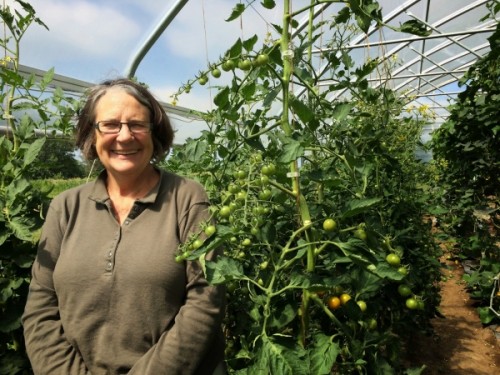This is the 1st profile in a 3-part series.
 Denise O’Brien distributes vegetable shares to the members of her community supported agriculture (CSA) program from her former dairy barn in Atlantic, Iowa. Denise and her husband, Larry Harris, haven’t milked cows since 1995, but the converted barn-turned-vegetable-shed—along with the chicken house, orchard, vegetable beds and new high tunnel for season extension—chart the life and cycles of a decades-old diversified farm. For almost forty years, keeping the farm going has meant adaptation and evolution—and it has also meant fighting for the survival of the farming community.
Denise O’Brien distributes vegetable shares to the members of her community supported agriculture (CSA) program from her former dairy barn in Atlantic, Iowa. Denise and her husband, Larry Harris, haven’t milked cows since 1995, but the converted barn-turned-vegetable-shed—along with the chicken house, orchard, vegetable beds and new high tunnel for season extension—chart the life and cycles of a decades-old diversified farm. For almost forty years, keeping the farm going has meant adaptation and evolution—and it has also meant fighting for the survival of the farming community.
Denise grew up in Atlantic, but only began farming once she married Larry. He grew up on the farm where he and Denise live; his family, like most farmers a generation ago, grew vegetables, raised chickens and hogs, and milked cows for a while. Larry headed west when he left home, and went to work in a Colorado mine. He didn’t stay away long; the first Earth Day in 1970 and the growing environmental movement impacted him deeply, and he decided to move back to Iowa to become an organic farmer.
The couple began raising beef calves in 1976, along with feed crops—they got out of soybeans after the first several years, because Larry didn’t want to become a corn and bean famer as was rapidly becoming the norm, but rather corn, oats, and hay, and some perennial berries and asparagus. They added dairy cows because, as organic farmers, they needed a ready source of organic fertilizer. Just as important, they wanted to raise their three children together as two full-time parents. Milking cows allowed them to do just that for a decade and a half, until their youngest daughter was starting high school; a time Denise looks back on idyllically. “The whole life centered around the barn,” she says. “The kids would come down, Larry and I would talk about things and made decisions together… we were really tight.”
Denise and Larry sold their dairy cows in 1995, when the financial stress outweighed the reward—the price of milk was falling, the price of feed was rising, and the future felt uncertain. Larry went to work off the farm, and they ran a u-pick operation and eventually began the CSA with vegetables and chickens. They had made it in dairy farming longer than many others and kept their farm through the 1980s farm crisis, but many in their community had not been so lucky.
Denise and Larry had become politically active around the same time they had begun farming, organizing around renewable energy and nuclear free zones. A group of young activists—”we kept meeting each other at Democratic events and food buying clubs,” says Denise of her early colleagues—formed the Progressive Prairie Alliance. The group initially assisted landowners to negotiate fair leases with prospecting oil companies; when the farm crisis really hit, in the mid-1980s, Denise became very involved with the Iowa Farm Unity Coalition, protesting farm foreclosures at the Iowa State House. “I practically lived there in the eighties,” she says of the state house.
Being an activist dairy farmer worked well. “You always had to be home at milking time, but if there was a protest somewhere in the middle of the day, we could take off and still be home in time to milk… in the wintertime when it was less busy, you could be at the state Legislature, and if you could find somebody to milk the cows, you could go to Washington.” Plus, she had a supportive partner: “Larry and I had a deal,” she says. “He stayed home and I went on the road; that was our agreement from the beginning.”
So she kept at it. During the farm crisis, she became particularly interested in women, as it became clear to her that they were the ones calling attention to the crisis and seeking help. In farm families, women were the bookkeepers; they saw the writing on the wall and tried to address the problem, while men, she says, “were in denial. They hoped if they kept their heads down and worked harder, things would just go away and everything would be alright.” But although women were sounding the alarm, “[their] voices weren’t being heard. They were not at the decision-making table. I felt like the whole scenario would be different if women were involved in the solutions.” In response, Denise founded and directed the Rural Women’s Leadership Development Project as part of the organization PrairieFire Rural Action.
Continue reading on WhyHunger’s Digital Storytelling Website.
About the Author Siena Chrisman has worked on sustainable food and farm issues for more than a decade. Her writing has appeared in Civil Eats, Modern Farmer and Grist, among other outlets. Formerly an organizer and writer with WhyHunger, where she was director of the online Food Security Learning Center and manager of the Connect Blog, her current freelance research and writing focuses on commodity farmers, livestock and farm policy. Siena was raised on raw milk in rural Massachusetts, and now lives in Brooklyn.





